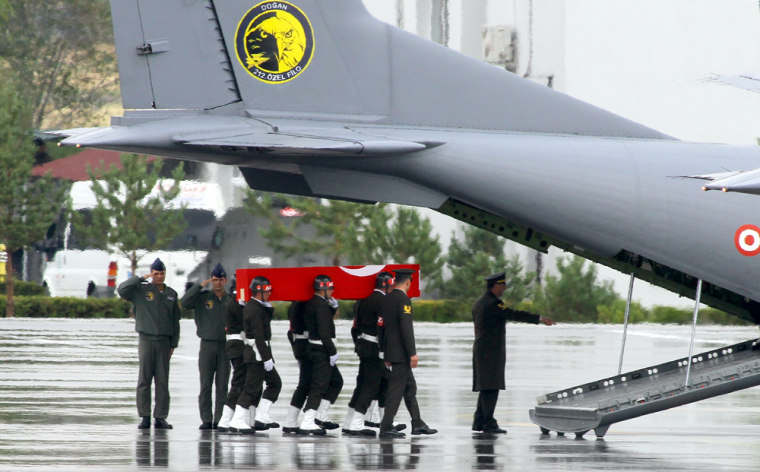About 10,000 elite Turkish soldiers were taking part in a ground offensive against Kurdish rebels in southeastern Turkey and across the border in Iraq on Thursday, making it the nation's largest attack on the insurgents in more than three years, the military said.
The offensive began Wednesday after Kurdish rebels carried out raids near the Turkey-Iraq border that killed 24 Turkish soldiers and wounded 18, the insurgents' deadliest one-day attacks against the military since the mid-1990s.
The military said in a statement Thursday that 22 battalions, or about 10,000 soldiers, were taking part in the offensive in southeastern Turkey and northern Iraq, but it did not say how many were in each country.
NTV television said most of the troops were believed to be in Iraq.
It was Turkey's largest such offensive since February 2008, when thousands of ground forces staged a weeklong offensive into Iraq on snow-covered mountains.
The military said the soldiers in the current operation are commandos, special forces and paramilitary special forces — making it an elite force trained in guerrilla warfare. They are being reinforced by F-16 and F-4 warplanes, Super Cobra helicopter gunships and surveillance drones.
Prime Minister Recep Tayyip Erdogan refused to share details of the military's offensive. The military only said the offensive was concentrated in five separate areas it did not identify.
"Our goal is to achieve results with this operation," Erdogan told a nationally televised news conference. "The military is determinedly carrying out this (operation), both from the air and the ground."
The military said the offensive was launched because the rebels had staged Wednesday's deadly simultaneous attacks on eight separate targets, including military and police outposts.
Iraq expresses support
In its first comment since those attacks and the start of Turkey's offensive, Iraq's government on Thursday condemned the rebel attacks and promised to stop them from using Iraqi territory for future attacks against Turkey.
"The Iraqi government stresses again that Iraq will not be a haven or a shelter to any foreign armed and terrorist group," the Iraqi Foreign Ministry said in a statement on its website, adding that both Baghdad and the regional Kurdish government in northern Iraq "are committed to secure the borders" to prevent the repetition of such attacks.
A senior Iraqi Kurdish official, Nechirvan Barzani, was in Ankara and expected to be received by Erdogan shortly.
The Kurdish rebel attack outraged many Turks and fueled nationalist sentiment. Thousands of high school students, carrying Turkish flags, marched in the streets of the Turkish capital on Thursday.
"Tooth for tooth, blood for blood, vengeance!" students chanted in support of the military as they marched through the affluent Tunali Hilmi district. At one point, the students stopped traffic to sing the national anthem as some shopkeepers joined them and passers-by stood still in respect.
The Kurdish provinces of northern Iraq are mostly stable and prosperous. But to Turkey, which has a large Kurdish minority, they also are an inspiration and a support base for the Kurdish rebels.
Turkey's Kurdish rebel conflict has killed tens of thousands of people since the insurgents took up arms for autonomy in the country's Kurdish-dominated southeast in 1984.
